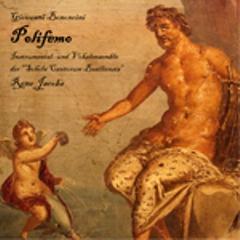Bononcini - Polifemo (1987)
Bononcini - Polifemo (1987)

1. Part I 2. Part II 3. Part III 4. Part IV 5. Part V 6. Part VI Polifemo - Hans-Christian Ziegler (bass) Acis - Gerd Türk (tenor) Galatea - Martina Bovet (soprano) Glauco - Akira Tachikawa (countertenor)italian comp-oser Silla - Nadja Ragni (alto) Circe - Regina Jacobi (mezzo-soprano) Venus - Gundula Anders (soprano) Schola Cantorum Basiliensis Rene Jacobs - conductor Berlin 8.7.1987.
As far as the opera of the baroque is concerned, most attention has been given to the operas by Handel. Only recently the dramatic works of composers like Alessandro Scarlatti and Antonio Vivaldi is paid attention to. So far the operas by Giovanni Battista Bononcini seem to have escaped the interest of conductors and directors. It is therefore something special when an opera by Bononcini is performed, as was the case last week in Utrecht and Amsterdam. It was the Dutch conductor Jos van Veldhoven, artistic director of the Netherlands Bach Society, who conducted the Utrechts Barok Consort (UBC) in two performances of Bononcini's opera Polifemo, which was first performed in Berlin in 1702.
It was not the first time Van Veldhoven paid tribute to the qualities of this neglected master of the Italian baroque. Previously he performed the opera Il trionfo di Camilla (first in an abridged edition in 1995, then complete in 1997), and only last year he conducted the UBC in Bononcini's oratorio San Nicola di Bari.
Polifemo is a pastoral play, which is based on Ovid's Metamorphoses. Two separate stories from book XII are combined here. There is Polifemo, who is in love with the sea nymph Galatea. But she rejects him in favour of the shepherd Aci.
On the other hand we have Silla and Glauco. The sorceress Circe is in love with the sea god Glauco and obstructs his attempts to win the heart of the nymph Silla.
Remarkably Polifemo doesn't get that much attention in this opera. His role is limited, but he is brilliantly portrayed as a simple, straightforward and one-dimensional character, and until the very end, when he kills his rival, he is much more comical than frightening. This is reflected in the music: his arias are rather unsophisticated and simple (in particular the strophic aria 'Dieci vacche'). And the aria 'Vanarella, pazzarella' would not be out of place in an intermezzo. In contrast, Circe, the other evil character in this opera, gets much more attention. Whereas Polifemo is turning to brute force to get what he wants, she uses tricks to turn Glauco's attention away from Silla and win his heart. One of the highlights of the opera is her rage aria 'Pensiero di vendetta'. Another beautiful moment is the duet of Aci and Galatea 'Č cara la pena', with the voices imitating each other.
Having heard Polifemo one wonders why it hasn't been performed more often. And if this opera is representative of Bononcini's dramatic oeuvre, then certainly a Bononcini revival would be very worthwhile.
This opera is full of great and expressive arias. In most arias the singer is supported by basso continuo only, sometimes with additional melody instruments. In some the cello does play a prominent role, perhaps reflecting the fact that Bononcini himself was a professional cellist. Other arias feature two recorders, one or two oboes (the oboe parts in Silla's aria 'Soccorrete e non tardate' are gorgeous) or a solo violin (Galatea's aria 'Cor contento fra catene' starts with a virtuoso violin solo). In many arias the strings only play in the concluding ritornello. A special effect is the pizzicato in the string basses in Glauco's aria 'Queste goccie', during which he pours a magic potion into the water which has given to him by Circe with the false pretext that it will make Silla falling in love with him. ---Johan van Veen, musica-dei-donum.org
download (mp3 @192 kbs):
yandex mediafire ulozto gett bayfiles
